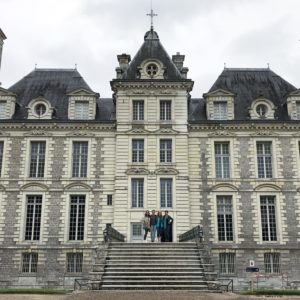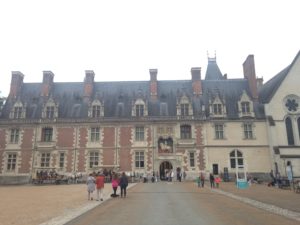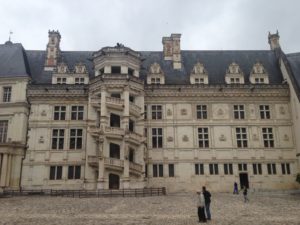June 25th – July 1st
I’m back on my castle-visiting kick. I visited three this weekend alone. (It’s Sunday evening.) Yesterday I went on an Institute trip to Cheverny, a castle that was an aristocratic (not royal) residence still furnished with its own original 1800s furniture, and Chambord, a gigantic (seriously, gigantic) castle built by Francois I in the early 16th century. Today I took the train on my own to Blois, a castle which I’d never heard of before but is now maybe my third favorite of all of them (this is significant, since I’ve visited eight castles so far. My French summer is one part language immersion and one part history/architecture tour of the Loire Valley.) Blois was a primary royal residence in the 16th and 17th centuries, and was then the subject of a massive restoration project in the 19th century, which means it’s a) full of history and b) really well-restored. Catherine de Medici died in it.

Cheverny, featuring me and some of my friends. I didn’t get any pictures at Chambord, since my phone died. Which is awful, because I loved Chambord, and it was really impressive.

Blois makes a U shape; this is the left side of the U.

This is the right side of the Blois U-shape.
Class sessions at the Institute last four weeks, so at the end of last week I moved up a class. Now, in phonetics class, we’re learning how to speak and understand “familiar” French (French slang, informal pronunciation, etc.). This is fun, but difficult, since I’ve been having enough trouble learning how to speak and understand formal French. My new class is also more lecture-heavy than my old one, which focused a lot on discussion and student presentation. I miss the discussion, but I’m now learning some significant things about French writing structures, and have added several words to my vocabulary.
I went to see a documentary with a friend this past week, and I was actually able to understand and follow it really well. Not perfectly, but really well. Unlike Finding Nemo, I had never seen this documentary before, nor was I familiar with its subject matter.
Sometimes it’s difficult here to actually gauge my language progress. It’s slow and gradual, and it’s difficult to see changes day-to-day, or even necessarily week-to-week. To make matters worse, the more I learn, the more I realize I still have to learn. Paradoxically, the more competent I actually become at French, the less competent I feel. But having benchmarks, like understanding a documentary this week when three weeks ago I couldn’t understand a two-minute sound byte, helps.
In other news, nearly all the American students have left the Institute. June is a really big month for American university groups to go to the Institute, but they usually only stay four weeks. So, in June, the Institute is majority American, but now I’m actually the only American in my class.
However, even though the Americans are nearly all gone, almost everyone here still speaks English to each other. This is a problem that we actually had a (French) discussion about in class the other day. The thing is, practically no one from a non-English-speaking country is learning French as their second language. If you want to learn a useful second language, and you don’t already speak English, you’re going to learn English, and then after that you’ll learn French or another less-widespread language. It’s not everyone, but the majority of people at the Institute have either grown up bilingual with English, or have been learning English for years. (There are also some people who are here learning French as their fourth or even fifth language). So most of the time, everyone’s highest-competency common language is English. And everyone is at different levels of French. So most of the time when we all talk to each other, we speak English. I’ve hung out with people from Taiwan, Turkey, Colombia, Spain, Germany, Switzerland, Japan, Sweden, and China, and that’s just a few of them, but with minimal exceptions we’ve communicated for the most part in English. It’s made me realize how lucky I am to have such a ubiquitous language as my native one, but it’s also been a real difficulty (for all of us) as we’re trying to immerse ourselves in French. Sometimes, we’ll impose a strict French-only rule on ourselves for lunchtime or something, but most of the time we take the English path of least resistance. I speak only French to my host family, and in class, and to people like shopkeepers, museum guides, bus drivers, and doctors, but I would probably be making even more conversational progress if I were speaking French with my friends here too.